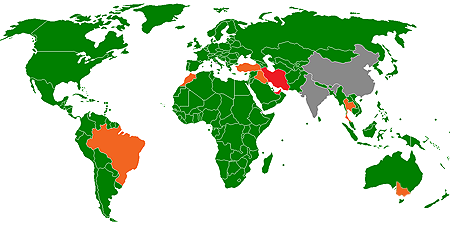
The popular service Youtube is a wonderful tool to promote all kind of information. But some countries find this too dangerous for multiple reasons (mainly political and/or religious). Have a look at the map below. It represents a world map of countries were Youtube is/was blocked:
 |
I’m the owner a rootshell.be, a service which offers free UNIX shell accounts and for a few weeks, I detected more and more requests (759 to be precise) coming from Turkey. People were asking SSH tunnel to access youtube.com from Turkey.
I analyzed my web server log files and found that my site was referred on a big portal called pclabs.gen.tr (here is the posted article: http://www.pclabs.gen.tr/2008/06/02/youtube-ip-engeline-yasal-guvenilir-ve-kesin-cozum/ – Is there a Turkish speaking people who could translate it for me?). They explain how to use a SSH tunnel to access Youtube. Result: 4163 videos have been viewed thru SSH tunnels on rootshell.be in June 08.
The fact that they use my service is not the problem here, everything is logged and restricted to least privilege. But, it demonstrates that filters set by authorities in Turkey or ongoing projects like the one in France will never be the right solution.
We can split this problem in several cases:
- Filters are applied to protect users against external risks (example: pedophilia). Filters will never do the job with 100% of reliability. It’s mandatory to perform education in parallel (don’t disclose personal data, don’t surf on suspicious web sites, …)
- Filters are applied to prevent the users to access illegal online resources (mainly multimedia files). In this case, it’s prohibited by laws and filters must be in place but in the right way. Protocols used by most Peer-2-Peer networks are also used to spread legal files such new Linux distributions or contents.
- Filters are applied to prevent the users to access immoral resources (religious or political). In this case, the danger comes from a main authority which decide if some information is immoral or not. I’ll not debate about religions or politic here, authorities have maybe good reasons to restrict some information but, like in case #2, they cannot block a service which can be also used for “classic” purpose.
What’s your opinion?